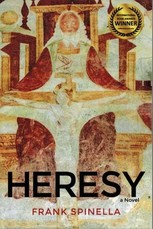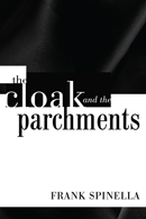
It is early in the fourth century, and Christianity has become a religion in search of a theology. Roman persecution has ended, but doctrinal debates threaten to tear the church apart as the early church fathers strive to solve a mystery inherited from their apostolic tradition: how Father and Son might both be thought of as God, and yet as distinct, without doing violence to the tenet that God is One.
Enter Arius, a Libyan priest who comes to Alexandria to preach an answer: that the Son of God is a created being of a different substance than the Father, and not fully divine. When the Archbishop condemns his teachings and banishes him from the city, his local apostacy becomes a worldwide schism, as bishops and clergy throughout the Mediterranean world take sides. Desperate to use the religion as a force for political unity, the Christian emperor Constantine calls a convention of bishops at Nicaea to resolve the dispute. As debate begins, a consensus answer seems out of reach―until a young Alexandrian deacon presses a solution that will forever shape orthodoxy in a different direction.
Winner of the 2014 International Book Award for Religious Fiction.
Enter Arius, a Libyan priest who comes to Alexandria to preach an answer: that the Son of God is a created being of a different substance than the Father, and not fully divine. When the Archbishop condemns his teachings and banishes him from the city, his local apostacy becomes a worldwide schism, as bishops and clergy throughout the Mediterranean world take sides. Desperate to use the religion as a force for political unity, the Christian emperor Constantine calls a convention of bishops at Nicaea to resolve the dispute. As debate begins, a consensus answer seems out of reach―until a young Alexandrian deacon presses a solution that will forever shape orthodoxy in a different direction.
Winner of the 2014 International Book Award for Religious Fiction.

Told in the first person by the author of the Gospel of Mark, The Cloak and the Parchments relates the story of how the earliest gospel came to be written against the backdrop of emergent Christianity’s doctrinal tensions. But it is also the story of one man's struggle of faith.
The year is 64 C.E., and Paul has summoned his disciples Mark and Timothy from Ephesus to his prison cell in Rome. On their journey, the travelers discuss Mark’s lingering doubts about Paul’s teaching that through the sacrifice of Christ as the true Son of God, much of Jewish law has become obsolete. As the dialogue between the two evolves, Timothy’s calm apologetics persuade Mark that Paul’s views are correct and that baptism is indeed the equivalent of circumcision. But on reaching Italy, the two travelers meet up with Peter, whose account of Jesus’ ministry is more consistent with traditional Jewish beliefs. As Peter relates Jesus’ parables and discourses with his apostles and asks Mark to chronicle them, Mark's religious doubts increase. Which one of these two pillars of the Faith is right?
There will be no opportunity to hear Peter and Paul debate their disparate views and resolve Mark's crisis of faith, for the travelers arrive in Rome just at the outbreak of the Great Fire, which is promptly blamed on the Christians and results in Peter’s arrest. When Paul urges Mark to leave the city and write Peter’s account within the context of Paul’s own teachings, Mark finds himself conflicted by his promises to both men, and by the disparity between Peter’s eyewitness testimony and Paul’s claim to direct revelation. In the end, Mark finds the answer he seeks hidden in the depths of his own religious experience – as ultimately, we all must.
The year is 64 C.E., and Paul has summoned his disciples Mark and Timothy from Ephesus to his prison cell in Rome. On their journey, the travelers discuss Mark’s lingering doubts about Paul’s teaching that through the sacrifice of Christ as the true Son of God, much of Jewish law has become obsolete. As the dialogue between the two evolves, Timothy’s calm apologetics persuade Mark that Paul’s views are correct and that baptism is indeed the equivalent of circumcision. But on reaching Italy, the two travelers meet up with Peter, whose account of Jesus’ ministry is more consistent with traditional Jewish beliefs. As Peter relates Jesus’ parables and discourses with his apostles and asks Mark to chronicle them, Mark's religious doubts increase. Which one of these two pillars of the Faith is right?
There will be no opportunity to hear Peter and Paul debate their disparate views and resolve Mark's crisis of faith, for the travelers arrive in Rome just at the outbreak of the Great Fire, which is promptly blamed on the Christians and results in Peter’s arrest. When Paul urges Mark to leave the city and write Peter’s account within the context of Paul’s own teachings, Mark finds himself conflicted by his promises to both men, and by the disparity between Peter’s eyewitness testimony and Paul’s claim to direct revelation. In the end, Mark finds the answer he seeks hidden in the depths of his own religious experience – as ultimately, we all must.
